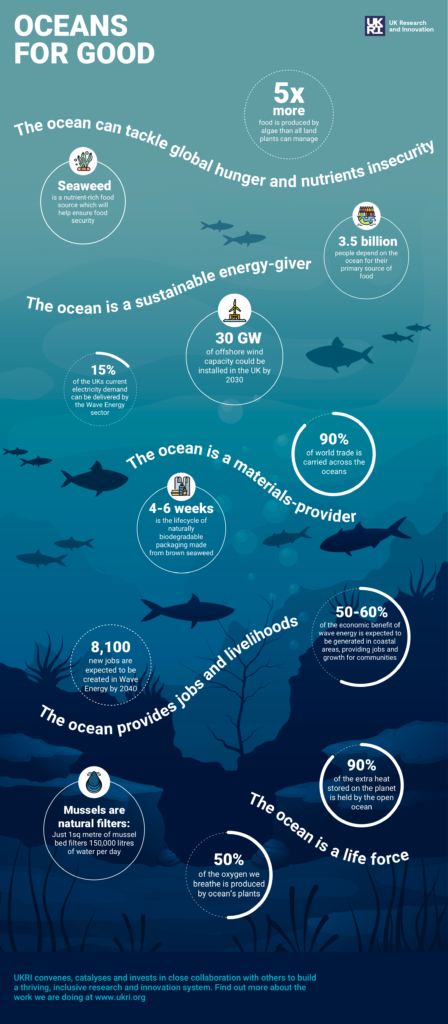The ocean is the heart of our planet; it has been vital to humanity’s development, supporting nations, communities, and societies for centuries. It drives weather, regulates temperature, provides us with oxygen and delivers nutrients to support marine habitats.
All human and marine life depends on the Earth’s oceans for survival and with global warming becoming more prevalent in recent decades due to climate change, it has become increasingly important to conserve our oceans by implementing plans to reduce our carbon footprint and prevent ocean acidification.
In time for post-COP26 conversations on climate targets, UK Research and Innovation (UKRI) has produced an Oceans for Good infographic illustrating some of the many benefits of our seas.
Celebrating our Blue Planet
The oceans are a wonder to behold and a force for good in the fight against the climate crisis. Some of the key statistics highlighted in the infographic include;
- 90% of world trade is carried across the oceans
- 3.5 billion people depend on the ocean as their primary source of food
- 15% of the UK’s current electricity demand could be delivered by wave energy
- 30GW of offshore wind capacity could be installed in the UK by 2030
- 50-60% of the economic benefit of wave energy is expected to be generated in coastal areas, providing jobs and growth for coastal communities

Much of the ocean science data comes from the Wave Energy Innovation Position Paper, written by the Supergen Offshore Renewable Energy Hub, an Engineering and Physical Sciences Research Council (EPSRC) funded-programme that aims to accelerate the development of offshore wind, wave and tidal technology for the benefit of society.
Other statistics derive from the Plymouth Marine Laboratory, a charity that aims to develop and apply innovative marine science to ensure a sustainable future for our oceans.
Global Shipping: Driving Prosperity
The shipping and cargo industry is a key driver of global trade. The movement of goods across our seas is not only crucial for trade but also for driving prosperity. 90% of trade and global commodities are transported by ship to factories and ports around the world, making shipping one of the most important industries in all of globalisation. Shipping provides affordable and efficient transport of goods, increases the flow of world trade, and promotes economic growth in developing countries.
Ocean freight costs have been steadily declining for decades as a result of new technologies and improvements in efficiency. With a focus on sustainability and safety, the industry must also continue to innovate.
Sustainable Ocean Energy Solutions
The consumption of resources has reached a critical level. The world is running out of fossil fuels, and it is a race against the clock for industries to meet our growing energy demands.
Fortunately, the ocean is a powerful source of energy with an almost infinite capacity to produce electricity. Ocean energy is very cost-effective, reliable, and has the potential to be the most comprehensive of all renewable energies available. We must adapt and adopt this form of energy to reduce our dependence on fossil fuels and prevent climate change.
The abundance of energy under the ocean surface has been harnessed to meet human needs for centuries. Today’s technology has introduced new methods to capture this power with more efficiency than ever before. Ocean energy includes waves, tides, currents and salinity gradients. Converting these natural sources to power will provide a reliable and sustainable energy supply.
Aquatic Foods against Global Hunger
The world is at a critical juncture in its fight against global hunger. It is estimated that there will be 9 billion people on the planet by 2050, and over 70% of them will live in areas of water-stressed countries. However, it is not all hopeless news: the oceans have an abundance of marine plants and algae, which have the potential to produce five times more food than all land plants combined.
At the heart of our food and nutrition insecurity is a lack of safe and sustainable access to nutritious foods. One way to reduce food and nutrition insecurity is by increasing the production of aquatic foods. Aquatic foods have very high nutrient richness and can be produced with relatively low environmental impacts compared to terrestrial meats.
Seaweed is a type of edible algae and is one of the most abundant types of biomass on Earth, with as much as 50% of the world’s population relying on it as their primary source of food. Bioactive marine seaweeds can also improve our health twofold by contributing minerals and amino acids, antioxidants and polyphenols, which promote cell proliferation and cardiovascular health.
Advancing Aquaculture
Seafood is a vital source of protein for humans. As the population continues to grow, the demand for seafood has also increased. Aquaculture is one possible solution to meet this increasing global seafood demand by producing food through farming aquatic animals and plants – such as shellfish, finfish, seaweed and algae – in tanks or large artificial ponds.
The shift to aquaculture has introduced many benefits, including decreased waste production, increased sustainability, and a decreased dependence on wild populations.
The British Ports Association is the national membership body for ports in the UK. We represent the interests of operators that handle 86% of all UK port traffic to Westminster and devolved Governments and other national and international bodies. Learn more from our Media Centre.
